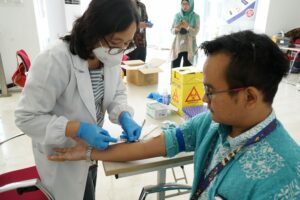Universitas Indonesia (UI) through the Faculty of Medicine (FK) has once again created innovation in the health sector. This time, the innovation that is developed is the Digital Neo Microcapillary, which is a portable medical device for examining blood viscosity which is useful for the development of stroke diagnostics. This medical device was developed by FKUI–Dr. Cipto Mangunkusumo Hospital (RSCM) Teaching Staff, Dr. dr. Al Rasyid, Sp.S(K), in collaboration with PT Neo Teknologi Global.
Deputy Minister of Health of the Republic of Indonesia (RI), Prof. dr. Dante Saksono Harbuwono, Sp.PD-KEMD, Ph.D., who was present at the Neo Digital Microcapillary Launching event—taking place on Tuesday (10/10), at the IMERI FKUI Hall, Central Jakarta—expressed his appreciation for this innovation. According to him, Digital Neo Microcapillary is one answer to the high number of imports of medical devices in Indonesia. The high number of imports is the main problem currently being addressed by the government through health system transformation.
“Collaboration and synergy between government, industry, and academia are starting to show positive impacts. FKUI Innovation Team, Dr. dr. Al Rasyid, Sp.S(K), and PT Neo Teknologi Global have successfully produced medical devices that have distribution permits from the Indonesian Ministry of Health. I am optimistic that this tool will bring changes in the field of health services, especially for stroke treatment,” said Prof. Dante.
The creation of the Digital Neo Microcapillary innovation was motivated by the high death rate due to stroke. Dr. dr. Al Rasyid said that now, stroke is the second cause of death after heart disease and is the main cause of disability in Indonesia. Based on Basic Health Research (Riskesdas) in 2018, the incidence of stroke in Indonesia increases every year.
Meanwhile, data from the Indonesian Stroke Registry from 2012 to 2014 showed that the incidence of ischemic or blocked strokes (67%) is higher than hemorrhagic or bleeding strokes (33%). Therefore, detection of increased blood viscosity (hyperviscosity) determines the success of treatment in acute ischemic stroke patients. This is because hyperviscosity plays a role in the expansion of infarction which causes increased patient morbidity and mortality if not treated quickly and appropriately.

Apart from treating acute stroke patients, blood viscosity examinations are also carried out on healthy people as a form of screening. If a condition of blood hyperviscosity is found in a healthy person who has risk factors for stroke, the doctor can provide treatment to prevent stroke, both through medication and non-medication.
Currently, to measure blood viscosity, the Brookfield LV-DV III instrument is used. However, checking with this tool takes a long time, around a matter of days. In addition, it’s not easy to use and expensive, and is only available in large laboratories or certain hospitals.
To answer these needs, Digital Neo Microcapillary comes with several advantages. This tool is portable and has an ergonomic design with modern color variants. The price is more affordable than similar tools. In terms of function, this tool has a high level of precision and accuracy with inspection results that can be obtained quickly.
“With Digital Neo Microcapillary, examination of plasma or whole blood viscosity is not affected by turbidity due to hemolysis factors or redness of the plasma, jaundice or yellowness, and lipemia from triglycerides. As a result, there is no interference with the reading of blood viscosity results. This makes the examination more precise with good accuracy and results are obtained faster in just a matter of seconds,” said Dr. dr. Al Rasyid.
Digital Neo Microcapillary has been researched by Dr. dr. Al Rasyid since 1997 and has been published in various national and international journals. This tool continues to be developed until it has good sensitivity and specificity compared to the gold standard tool.
With the various advantages it offers, this innovative tool is expected to help clinics, laboratories, health centers and hospitals in the diagnosis process by early detection of the possibility of a stroke, and even monitoring the course of the disease. “Of course, through this innovation, we hope the world of medicine, especially in the neurovascular field, can make it easier to provide the best service for stroke patients and patients who have risk factors for stroke,” said Dr. Dr. Al Rasyid.
For the launch of this innovation tool, the Dean of FKUI, Prof. Dr. dr. Ari Fahrial Syam, SpPD-KGEH, MMB, said, “I hope that the innovative product produced by Doctor Al Rasyid in collaboration with PT Neo Teknologi Global can have an extraordinary impact because of its use for detecting the risk of stroke. Currently, stroke is one of the diseases that is of concern to the Ministry of Health. So, this innovation is in line with what is being fought for and hopefully this product can be accepted in the market.”
